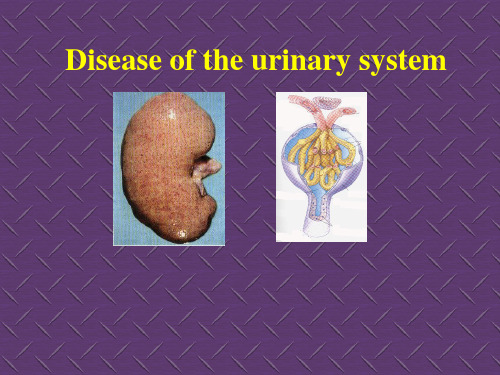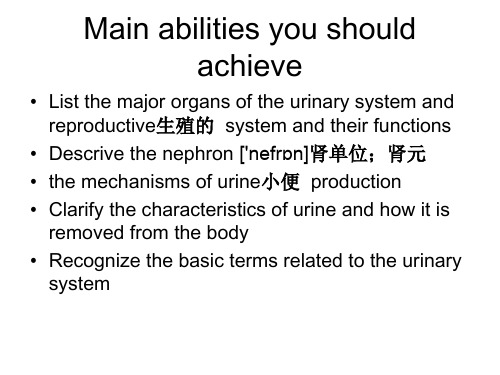泌尿系统科普文章英语
- 格式:docx
- 大小:12.76 KB
- 文档页数:2

泌尿外科英文介绍范文英文回答:Introduction to Urology.Urology is a medical specialty that focuses on the diagnosis and treatment of conditions related to theurinary system in both males and females, as well as the male reproductive system. As a urologist, my role is to provide comprehensive care for patients with urological conditions, ranging from kidney stones and urinary tract infections to prostate cancer and erectile dysfunction.One common condition that urologists often encounter is urinary incontinence, which refers to the involuntary leakage of urine. This can be a distressing problem for patients, as it affects their quality of life and can lead to embarrassment and social isolation. As a urologist, I help patients manage their urinary incontinence through a combination of lifestyle modifications, pelvic floorexercises, medications, and in some cases, surgical interventions.Another condition that urologists frequently treat is benign prostatic hyperplasia (BPH), which is the enlargement of the prostate gland. This can cause urinary symptoms such as frequent urination, weak urine flow, and difficulty in emptying the bladder completely. Treatment options for BPH include medications to relax the prostate muscles and surgery to remove or reduce the size of the prostate gland.Urologists also play a crucial role in the diagnosis and treatment of urological cancers, such as prostate, bladder, kidney, and testicular cancers. Early detection is key in improving treatment outcomes, and urologists utilize various diagnostic tools, such as imaging studies and biopsies, to accurately diagnose these cancers. Treatment options may include surgery, radiation therapy, chemotherapy, or a combination of these modalities.In addition to these conditions, urologists also treatmale infertility, perform vasectomies and vasectomy reversals, and manage conditions such as kidney stones and urinary tract infections. We work closely with other healthcare professionals, such as nephrologists, gynecologists, and oncologists, to provide comprehensive and multidisciplinary care to our patients.中文回答:泌尿外科简介。




泌尿外科英文介绍范文英文回答:Introduction to Urology.Urology is a branch of medicine that focuses on the diagnosis and treatment of diseases and disorders of the urinary system in both males and females, as well as the male reproductive system. As a urologist, I specialize in providing medical and surgical care for conditions such as kidney stones, urinary tract infections, bladder andprostate problems, erectile dysfunction, and infertility.In my practice, I often see patients with kidney stones, which are hard deposits that form in the kidneys and can cause severe pain when they pass through the urinary tract.I use a variety of treatments, including medication, minimally invasive procedures, and surgery, to helppatients manage their kidney stones and prevent future occurrences.Bladder problems, such as urinary incontinence and overactive bladder, are also common conditions that I treat. These conditions can greatly impact a person's quality oflife and can be embarrassing to discuss. However, it's important to remember that these are medical conditionsthat can be effectively managed with the right treatment. I work closely with my patients to develop personalized treatment plans that may include lifestyle changes, medication, or even surgery.Prostate problems, such as benign prostatic hyperplasia (BPH) and prostate cancer, are more commonly seen in older men. BPH is a non-cancerous enlargement of the prostate gland that can cause urinary symptoms such as frequent urination and weak urine flow. Prostate cancer, on theother hand, is a malignant growth of the prostate gland and requires prompt diagnosis and treatment. I work closelywith my patients to determine the most appropriatetreatment options based on their individual needs and preferences.In addition to these conditions, I also provide carefor male reproductive health issues, such as erectile dysfunction and infertility. These conditions can have a significant impact on a man's self-esteem and relationships, and it's important to approach them with sensitivity and understanding. I offer a range of treatment options, including medication, lifestyle changes, and assisted reproductive techniques, to help my patients achieve their reproductive goals.中文回答:泌尿外科介绍。

泌尿外科专业英语写作范文Urology, a specialized branch of medicine, focuses on the diagnosis, treatment, and management of diseases and conditions affecting the urinary tract and male reproductive system. It is a field that requires a deep understanding of both the anatomical and physiological aspects of these systems. Here is a sample essay on the subject:The Evolution of Urological PracticeThe field of urology has seen significant advancements in recent years, transforming the way urological conditions are managed. Technological innovations, coupled with a deeper understanding of urological diseases, have led to more effective treatments and improved patient outcomes.Early Detection and Diagnostic TechniquesOne of the most significant developments in urology is the early detection of diseases. With the advent of imaging technologies such as ultrasound, CT scans, and MRI,urologists can now identify abnormalities with greater precision. These non-invasive diagnostic tools have revolutionized the way urological conditions are diagnosed, allowing for more targeted and effective treatment plans.Minimally Invasive Surgical ProceduresThe introduction of minimally invasive surgical techniques has been a game-changer in urology. Procedures such as laparoscopic and robotic-assisted surgeries have reduced the need for open surgery, leading to fewer complications, shorter hospital stays, and quicker recovery times for patients. Robotic surgery, in particular, offers enhanced precision and control, which is especiallybeneficial in complex urological surgeries.Advancements in Prostate Cancer ManagementProstate cancer is one of the most common urological cancers affecting men. Advances in screening methods, such as the prostate-specific antigen (PSA) test, have improved early detection rates. Additionally, new treatment modalities like focal therapy, which targets only the cancerous tissue, have been developed to minimize the impact on the patient'squality of life.Urinary Incontinence and Pelvic Floor DysfunctionThe management of urinary incontinence and pelvic floor dysfunction has also seen significant progress. Newersurgical techniques and devices, such as artificial urinary sphincters and male slings, offer more effective solutionsfor patients suffering from these conditions. Behavioral therapies and pelvic floor exercises are also increasingly recognized as important components of treatment.The Role of Telemedicine in Urological CareThe integration of telemedicine in urological practice has been another notable development. Patients can now consult with urologists remotely, which is particularly beneficial for those living in rural areas or those with limited mobility. Telemedicine also allows for the remote monitoring of patients with chronic urological conditions, ensuring they receive timely care.ConclusionThe future of urology looks promising with ongoing research into new treatments and technologies. As the field continues to evolve, the focus remains on improving patient care, enhancing the quality of life for those affected by urological conditions, and ensuring that urological care is accessible to all.This essay provides an overview of the current state and recent advancements in the field of urology, highlighting the importance of innovation in improving patient care.。
怎样预防泌尿疾病英语作文Preventing Urological Diseases.Urological diseases are a broad category of conditions that affect the urinary system, which includes the kidneys, ureters, bladder, and urethra. These diseases can rangefrom minor infections to chronic and debilitatingconditions that significantly impact a person's quality of life. While some urological diseases may be hereditary or unpreventable, many can be avoided through lifestylechoices and proactive health measures.Maintaining a Healthy Lifestyle.A healthy lifestyle is crucial in preventing urological diseases. Eating a balanced diet rich in fruits, vegetables, and whole grains can help maintain the health of theurinary system. Drinking plenty of water is also essentialto flush out bacteria and toxins, keeping the urinary tract clean. Regular exercise can improve overall health andreduce the risk of developing urological conditions such as kidney stones or urinary tract infections (UTIs).Practicing Good Hygiene.Proper hygiene is another key factor in preventing urological diseases. It is essential to maintain cleanliness in and around the genital area to prevent infections. Men should practice regular testicular self-examinations to detect any abnormalities early. Women should wipe from front to back after using the toilet to prevent bacteria from entering the urethra. Additionally, avoiding the use of harsh chemicals or soaps in the genital area can help maintain the natural balance of bacteria.Regular Screening and Check-ups.Regular screenings and check-ups are crucial for early detection and prevention of urological diseases. Men and women should schedule routine visits with their healthcare providers to check for any abnormalities or risk factors. Screenings for conditions like prostate cancer, kidneydisease, and bladder cancer can help catch these diseases early, when they are most treatable.Managing Chronic Conditions.Chronic conditions like diabetes and hypertension can increase the risk of developing urological diseases. Managing these conditions through lifestyle changes, medication, and regular monitoring can help reduce the risk of complications. For example, keeping blood sugar levels under control in diabetes can help prevent kidney damage, and controlling blood pressure can reduce the risk of stroke or heart attack, which can affect kidney function.Sexual Health.Sexual health is also important in preventingurological diseases. Practicing safe sex can help prevent sexually transmitted infections (STIs) that can affect the urinary system. Using protection during sexual activity, limiting the number of sexual partners, and being aware of potential STI symptoms are all important steps inmaintaining sexual health.In conclusion, preventing urological diseases requiresa comprehensive approach that includes maintaining ahealthy lifestyle, practicing good hygiene, regular screenings and check-ups, managing chronic conditions, and promoting sexual health. By taking these proactive measures, individuals can reduce their risk of developing urological diseases and maintain a healthy urinary system. Remember, prevention is always the best medicine, so it's importantto stay informed and take action to protect your urological health.。
泌尿系统科普文章英语
I t is an important excretion route of human metabolites, and can also regulate water and salt metabolism and acid-base balance, and produce a variety of bioactive substances, which plays an important role in maintaining the stability of the environment in the body.The urinary system consists of one pair of kidneys, two ureters, one bladder, and one urethra.Urine produced by the kidney flows into the bladder through the ureter for temporary storage. When it reaches a certain amount, it is excreted through the urethra.So it can also be said that the urinary system is the general term of urination, urination, urine storage, urination organs.The ureter is a pair of slender pipes, the length of which is ~ 20~30cm, upper connected to the renal pelvis, down into the bladder, there are three strictures in the middle, is the stone retention site.The bladder is a urinary storage organ, the size and shape change with the urine, the bladder triangle between the two ureter port and the ureal port three connection, empty also smooth, here is a good site for tumor and tuberculosis.The urination reflex of the bladder is controlled by the cerebral cortex and the spinal cord urination center, and the pudendal nerve is transmitted to the somatic nerve, so the urination can be controlled by the
consciousness, and these structures are damaged and can cause urinary incontinence.If the urine can not be discharged from the bladder and stored in the bladder, called urinary retention.It is normal for infants to develop enuresis due to incomplete cerebral cortex development. Generally, this phenomenon of 2 to 3 years old can gradually disappear, and children with normal urination function can not control their own urination when sleep is called enuresis.。